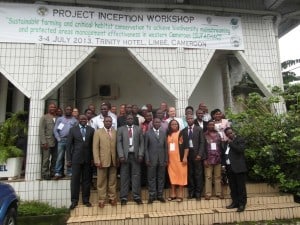
This revelation was made during a two day workshop on Sustainable Farming and Critical Habitat Conservation to Achieve Biodiversity Mainstreaming and Protected Areas Management Effectiveness in Southwest Cameroon. The workshop took place on July 3, 2013 in Limbe bringing together the Directors of GEF, FFI, UNEP and local implementing partners like the Environment and Rural Development Foundation (ERuDeF), the University of Dschang, CHEDE , collaborating Ministries, the representative of the Governor of Southwest Cameroon and other environmental Stakeholders.
The inception workshop was organized to prepare the logical framework for this 4-year project. Speaking at the workshop, the FFI Programs Manager for West and Central Africa Daniel Pouakouyou, said the project, which seeks to balance development and conservation, has three components-including supporting the initiative of the local community with special consideration to environmental protection and legislative issues plus institutional arrangements.
He cited the speedy gazettement of the proposed Tofala Hill Wildlife Sanctuary and the restoration of the Kupe Integral Ecological Reserve as top priority under this project. The Task Manager, Biodiversity/Land Degradation at UNEP Adamou Bhuari on his part, said 2/3 of the allocated amount ($1.7 million) from GEF will be used to support community based concrete conservation activities.
The Representative of the Governor of Southwest Cameroon M. Fabian Kenfack, drawing inspiration from Growth and Development Strategic Paper said the project will contribute to the country’s 2035 vision of becoming an emerging country. He advised the population of the project area between the Bakossi National Park and the Bayang Mbo elephant sanctuary to conserve their biodiversity as to benefit from environmental equilibrium, eco-tourism and all other ecosystem services that go with a healthy environment. Mr. Kenfack used this opportunity to beseech Cameroonians to contribute to biodiversity conservation via sustainable farming and habitat management, as to better their living conditions
To ensure that the project has the utmost desired success, FFI’s Program Director for Africa, Rob Brett’s divulged that “community structures that actually worked in the past, be built upon and put to good use in the project” with more local people involved in the project especially given that ‘It is not possible to achieve conservation objectives without community support’. He added that dialogue be promoted between protected areas and the people living around these areas. For all these to be possible according to him, Government ministries, project management team, local institutions and executing partners all have to work together to maximize resources and at the end of it all justify the global environment and social benefits that have been generated by the project.
A logical frame work for the project was developed with the validated project document to be submitted to GEF before the end of 2013. The Project implementation would begin within the first quarter of 2014.
By Ita Nawom



